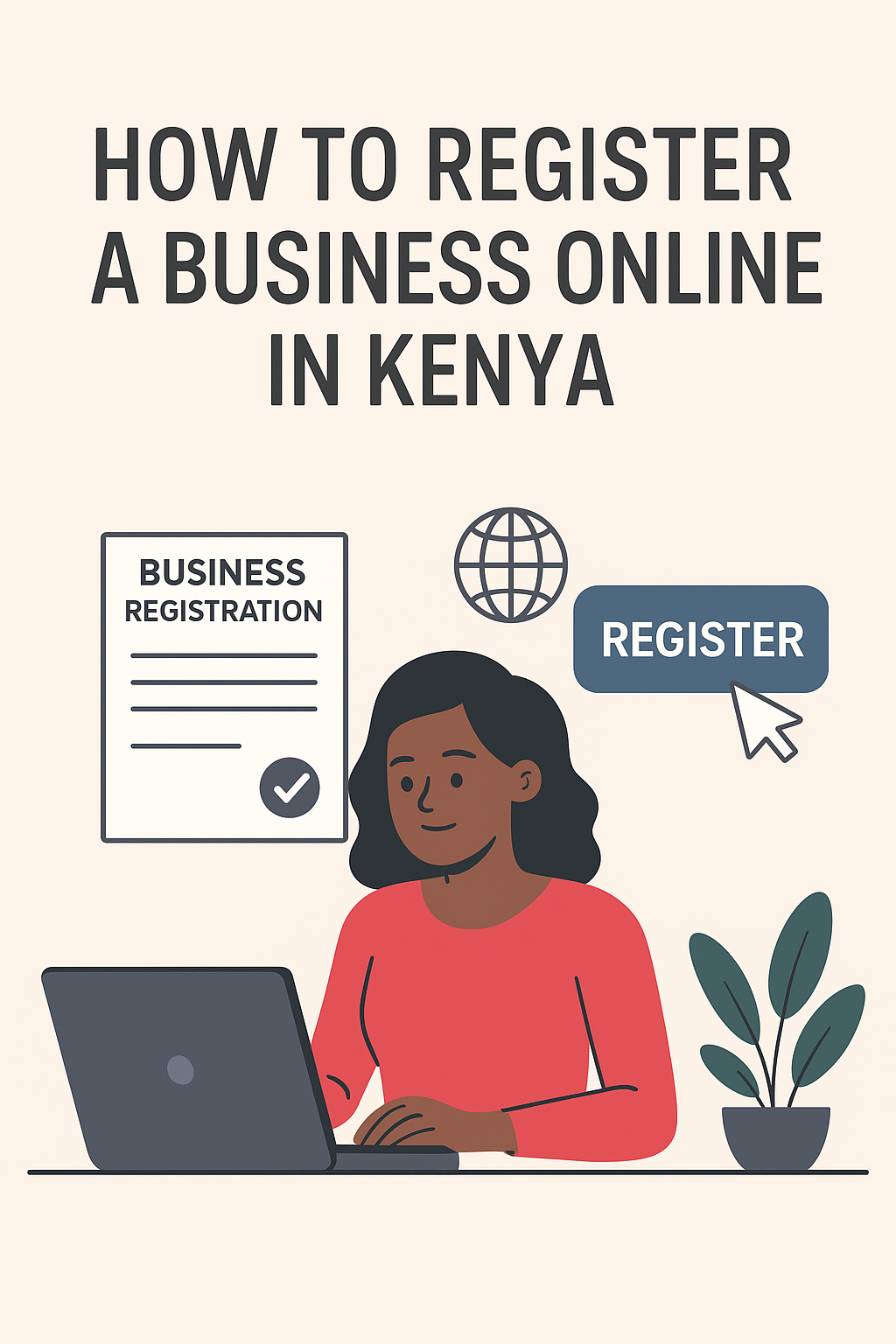How to Register a Business Online in Kenya: A Step-by-Step Guide for Entrepreneurs in 2025
In the fast-paced digital economy of 2025, starting a business in Kenya has never been easier, thanks to streamlined online platforms like the eCitizen portal. Whether you’re launching a small online store, a tech startup, or a service-based enterprise, registering your business online ensures legal compliance, protects your brand, and opens doors to funding, contracts, and growth opportunities. At Street.co.ke, we’re committed to empowering Kenyan entrepreneurs with practical insights on urban business trends, street-smart strategies, and the latest in economic developments. This comprehensive guide, updated for 2025, walks you through the process of registering a business online in Kenya. We’ll cover everything from sole proprietorships to limited companies, drawing on official procedures to help you avoid pitfalls and get started swiftly.
With Kenya’s economy projected to grow by over 5% this year, driven by sectors like e-commerce, agribusiness, and fintech, now is an ideal time to formalize your venture. The Business Registration Service (BRS) under the Attorney General’s office has made the process fully digital, reducing paperwork and processing times. However, success depends on preparation—gathering documents, understanding fees, and following steps meticulously. Let’s dive in.
Understanding Business Types in Kenya
Before registering, choose the right structure for your business. Kenya offers several options, each suited to different scales and risks:
- Sole Proprietorship (Business Name Registration): Ideal for individuals or small operations like freelance services, retail shops, or online sellers. It’s simple, low-cost, and gives you full control, but personal liability is unlimited.
- Partnership: For two or more people sharing ownership. Similar to sole proprietorship but requires a partnership deed.
- Private Limited Company (Ltd): Best for scaling businesses with multiple owners. It limits liability to shares invested and is preferred for attracting investors.
- Public Limited Company: For larger entities planning to list on stock exchanges.
- Limited Liability Partnership (LLP): Combines partnership flexibility with limited liability, suitable for professionals like lawyers or consultants.
For most startups, especially online businesses, a sole proprietorship or private limited company is the way to go. According to recent data from the Kenya National Bureau of Statistics, over 70% of new registrations in 2024 were sole proprietorships, reflecting the rise of micro-enterprises in the gig economy.
General Requirements for Online Registration
Regardless of type, you’ll need:
- A valid Kenyan ID or passport (for foreigners, a Foreigner Certificate or work permit).
- KRA PIN certificate (apply online via iTax if you don’t have one).
- Passport-sized photos (digital copies).
- Business details: Proposed names (at least three), nature of business, physical address, email, and phone.
- Proof of address (utility bill or lease agreement).
- For companies: Details of directors/shareholders, including IDs and addresses.
- Internet access and an eCitizen account.
Fees vary: Name search is Ksh 150, business name registration around Ksh 950, and limited companies up to Ksh 10,000 including stamp duty. Processing takes 1-7 days for approvals, but full registration can span 1-2 weeks.
Ensure your device supports PDF uploads and online payments via M-Pesa, card, or bank transfer. If you’re a foreigner, at least one director must be Kenyan for eCitizen access.
Step-by-Step Guide: Registering a Sole Proprietorship (Business Name)
This is the quickest online process, perfect for solo entrepreneurs. Here’s how to do it via eCitizen in 2025:
- Create or Log into eCitizen Account: Visit the eCitizen portal and sign up using your ID number, name, email, and phone. Verify via email and upload a recent passport photo (5.5cm x 5.5cm). This takes minutes and is free.
- Access Business Registration Service: Once logged in, navigate to “Business Registration Service” on the dashboard. Click “Make Application” and select “Business Name” for sole proprietorship.
- Propose Business Names: Submit three unique names. Avoid similarities to existing brands or offensive terms. Pay Ksh 150 for the name search via the portal. Approval usually comes within 1-2 days; you’ll get a notification.
- Fill Out the Application Form: Provide business details like nature (e.g., “online retail”), location, and owner info. Upload scanned copies of your ID, KRA PIN, and photo.
- Pay Registration Fee: The fee is Ksh 950 for standard registration. Use M-Pesa or card. Submit the form.
- Await Approval and Download Certificate: Check your dashboard for status. Once approved (typically 1-3 days), download your Certificate of Registration. This digital document is your proof of legitimacy.
- Post-Registration: Apply for a business permit from your county government (fees vary by location, e.g., Ksh 5,000-20,000 in Nairobi). Get a KRA PIN for the business if needed.
- Protect Your Brand: Register a domain and set up social media handles. Create a Google My Business profile for visibility.
This process can be completed in under a week, making it ideal for quick launches like dropshipping or content creation businesses booming in Kenya’s digital space.
Step-by-Step Guide: Registering a Private Limited Company
For more structured ventures, follow these steps. It’s more involved but offers better protection.
- Set Up eCitizen Account: Same as above. Ensure all directors have accounts if needed.
- Name Reservation: In BRS, select “Company” and propose a name. Pay Ksh 150 for search. Reserve for 30 days upon approval.
- Prepare and Submit Forms:
- CR1 (Application for Registration): Include company name, office location, directors’ details, shares, and objectives. Upload IDs and photos.
- CR2 (Memorandum of Association): Detail share capital (minimum Ksh 2,000 nominal), objectives, and liabilities.
- CR8 (Notice of Residential Address): List directors’ addresses.
- BN6 (Statement of Nominal Capital): Declare capital in Ksh.
- Draft Articles of Association: Outline internal rules, director powers, and shareholder rights. Use templates from eCitizen or hire a lawyer (cost: Ksh 5,000-10,000).
- Pay Fees and Stamp Duty: Registration fee is Ksh 10,600 (including Ksh 600 for forms). Stamp duty is 1% of nominal capital (min Ksh 2,140). Pay online.
- Submit Documents: Upload everything to BRS. If directors are foreign, include notarized IDs.
- Approval and Certificate: Processing takes 5-10 days. Download your Certificate of Incorporation from the portal.
- Post-Registration Compliance: Obtain a company seal, open a bank account, register for taxes via KRA iTax, and get necessary licenses (e.g., single business permit from county).
In 2025, BRS has integrated AI checks for faster verifications, reducing delays from previous years.
Fees, Timelines, and Additional Costs
- Name Search: Ksh 150 (1-2 days).
- Business Name Registration: Ksh 950 (3-5 days total).
- Limited Company: Ksh 10,000-15,000 including stamp duty (1-2 weeks).
- Other Costs: County permits (Ksh 5,000+), legal fees (optional, Ksh 5,000+), domain registration (Ksh 1,000).
Timelines have improved with digital submissions, but delays occur during peak seasons like January. Always check eCitizen for updates.
Post-Registration Essentials for Online Businesses
Once registered, focus on operational setup:
- Bank Account: Visit banks like Equity or KCB with your certificate, ID, and KRA PIN. It separates personal and business finances.
- M-Pesa Till or Payment Gateway: Apply via Safaricom for seamless transactions, requiring your registration docs.
- Accounting System: Use free tools like Wave or paid ones like QuickBooks to track finances.
- Licenses and Permits: For online sellers, get a KEBS certification if dealing with products. Comply with Data Protection Act for customer data.
- Taxes: Register for VAT if turnover exceeds Ksh 5 million annually.
For online-specific businesses, integrate with platforms like Jumia or your own site on street.co.ke-inspired models.
Tips for Success and Common Mistakes to Avoid
- Tip 1: Research names thoroughly using BRS search to avoid rejections.
- Tip 2: Use a professional email for applications to build credibility.
- Tip 3: Backup documents digitally and track application status daily.
- Common Mistake 1: Incomplete uploads—ensure high-quality scans.
- Common Mistake 2: Ignoring county permits, leading to fines up to Ksh 50,000.
- Common Mistake 3: Delaying tax registration, which can attract penalties.
Entrepreneurs often underestimate the value of consulting experts; consider firms like East Africa Business Consultants for complex setups.
Benefits of Registering Your Business Online
Going formal boosts credibility, enabling bank loans (e.g., via Hustler Fund), government tenders, and partnerships. In Kenya’s digital shift, registered businesses access e-commerce grants and export incentives. Online registration saves time and costs—no need for physical visits to Huduma Centres. Plus, it protects your intellectual property in a competitive market where cyber threats are rising.
Conclusion
Registering a business online in Kenya in 2025 is a gateway to entrepreneurial success, democratizing access for street hustlers and tech innovators alike. By following these steps on eCitizen, you can launch legally and focus on growth. At Street.co.ke, we celebrate the vibrancy of Kenyan business—from Nairobi’s bustling markets to remote online empires. If you’re ready to start, head to eCitizen today. For more tips on scaling your venture, subscribe to our newsletter. Remember, every big brand began with a simple registration. What’s stopping you?
By Tony Kibiko, Business and Innovation Contributor

